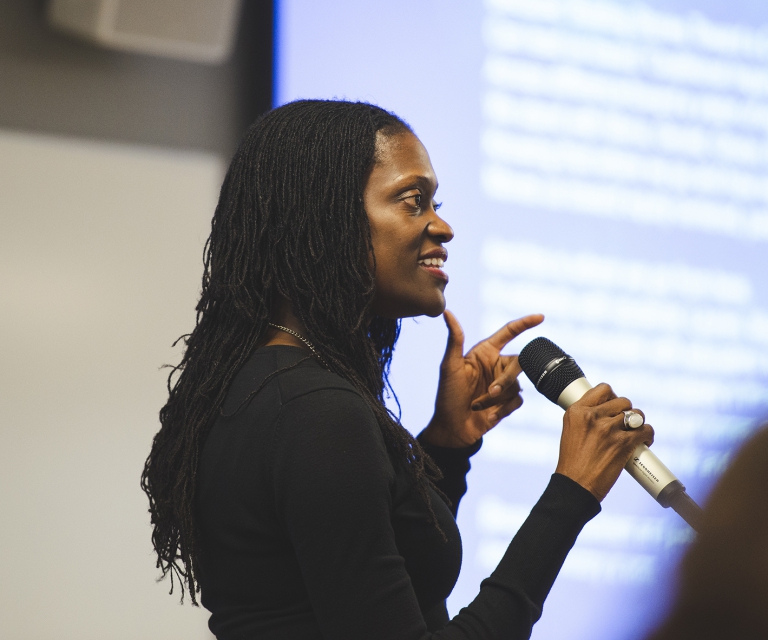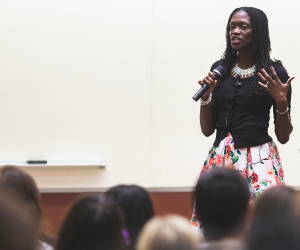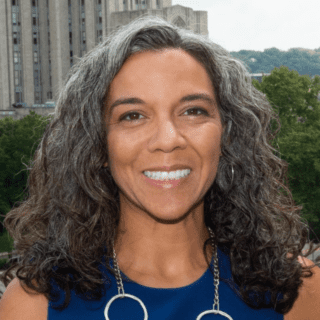
Dean Valerie Kinloch Releases New Book on Justice and Engaged Pedagogies
Where is the justice in education?
It is a question many find themselves asking in a world in which too many Black and Brown students receive an inadequate education and oftentimes face abnormally high discipline rates in comparison to their peers.
This question—and the search for answers—inspired Valerie Kinloch to write her new co-authored book, titled “Where is the Justice: Engaged Pedagogies in Schools and Communities” (Teachers College Press and NCTE, 2021). The book focuses on teaching and learning approaches that center dialogue, equity, and collaboration among stakeholders who understand and work against the heavy cost of inequality.
“During these uncertain times, I wonder about, I write about, and I live with the possibilities of justice,” says Kinloch, professor and Renée and Richard Goldman Endowed Dean at Pitt Education. “What does justice mean, involve, require, indicate, and need from each and every one of us? What does justice feel like, look like, and represent? And how can justice truly and productively impact education, learning, and human lives within schools and communities?”
Kinloch co-authored the book with Emily A. Nemeth, associate professor in the Department of Education at Denison University; Tamara T. Butler, executive director of the Avery Research Center and associate professor at the College of Charleston; and Grace D. Player, assistant professor in the Department of Curriculum and Instruction at the University of Connecticut.
There will be a virtual book launch event hosted by the School of Education on February 8, 2022 from 4:30 – 5:30 p.m. ET. Registration is required.
Particularly for students, families, teachers, school administrators, and community leaders, the book provides resources for those who seek to transform schools and classrooms into sites of engagement for equity, justice, and love. By extension, this transformation must happen in relation to and partnership with communities.
“We wanted to write about our collective work, our lessons, our learnings, and our growth by offering hopeful narratives about ways to reimagine schools and schooling with students, educators, and communities,” says Kinloch.
Incorporating the authors’ own experiences in teaching, learning, and with research, the book shares details on a longitudinal project in which they worked with multiple stakeholders within and across an urban public school district and its local communities to center engaged pedagogies.
One key takeaway shared in the book is that all students have a voice that should be honored.
“The book is about how students—as learners, teachers, and human beings—have agency, have brilliance, and have innovative ideas for improving education for themselves and for others,” says Kinloch.
While there is no easy or single answer to the question, “where is the justice,” especially in education, Kinloch and her co-authors hope to inspire their readers to continue to pursue it and to situate it as central in their engagements with others in schools and communities.
Says Kinloch: “Our hope is that folks will come to this work interested in engaged pedagogies and in leaning into the powerful work and legacy of bell hooks, especially when it comes to her belief that ‘When we all take risks, we participate mutually in the work of creating a learning community…Expanding both heart and mind, engaged pedagogy makes us better learners because it asks us to embrace and explore the practice of knowing together.’”
She adds: “This is our hope. This is our commitment. This book is one offering of that hope and commitment.”
Learn More
There will be a virtual book launch event hosted by the School of Education on February 8, 2022 from 4:30 – 5:30 p.m. ET. All are welcome to attend. Registration is required.




